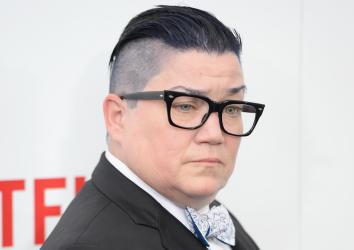I first began wearing men’s clothing a few years ago, because I thought that looking like a lesbian might help me get girls. Once I’d started, I realized almost immediately that I was feeling far more comfortable and confident and that I liked the way I looked in the mirror for the first time in my life. Other people who knew me said I looked more natural, more like my clothing fit my personality. It felt a bit like I’d been wearing an uncomfortable, ill-fitting costume all my life.
As I adjusted to this new information, it was hard not to notice that many of the people who shared my preference for the men’s section and my subtly masculine mannerisms had gone a step further and stopped identifying as women entirely. At times, it almost seemed as if, by not throwing my lot in with these pronoun creators and binary-rejecters, I might be just a little bit behind the times—a little square, uncool, perhaps even cis-sexist. Facebook has more than 50 possible gender identifiers. So why have I, a female-bodied person who wears men’s clothing, decided to stick with the increasingly old-fashioned “butch lesbian woman”?
In part, it’s because the language of gender identity has always been a bit bewildering to me—I’ve felt hungry, happy, gassy, and anxious, but never male or female. Even so, it has been tempting to interpret my experience in ways that separated it from that of other women. This is especially true because cis-gendered women have a distinct tendency to define themselves in ways that don’t include me. I hear women throw out things like, “As women, we all know how important it is to feel pretty,” or “We, as women, are naturally more tender and nurturing,” statements that never seem to include women like me. Not only do I dislike feeling pretty and prefer arguing to nurturing, I don’t even particularly like eating chocolate. Popular culture, and women themselves, often imply that I lack many of the most essential qualities of womanhood.
So in the past I’ve been quite tempted by the idea that perhaps I’m not a woman after all. I mean, I’m masculine in all sorts of ways—I am ambitious, logical, aggressive, strong, and highly competitive. And I’m certainly not silly, frivolous, dainty, weak, or overly emotional … Oh dear. That’s where I run into a major problem, isn’t it? When I start listing traits of mine that I’d call masculine, they’re always positive. They’re points of pride. Whereas when I list traits I lack that I’d call feminine, they’re negatives. It seems I can’t consider my own masculinity or lack of femininity without relying on some of the worst and most pernicious sex-based stereotypes. This suggests to me that the enterprise itself is suspect.
In our culture, the impulse to distance oneself from negatives associated with women and femininity is endemic. When we insult men, we do it by comparing them to women. When we compare women to men, we’re generally praising them. In fact, I’ve probably known more straight, cis-gendered women who’ve bragged about how they’re “one of the guys” than I’ve known lesbians. Ironically, one of the things I share with many women is my eagerness to point out all the ways in which I’m not like other women.
As girls grow up, they are bombarded by rules and restrictions governing the ways that they can be. I know I was—otherwise I wouldn’t have been a fully grown adult before I started wearing clothes that I found comfortable. These gendered rules confine girls’ choices and constrain their self-expression. Perhaps one day the gender binary will be dismantled totally, and we’ll all stop limiting our children by bringing them up as either males or females. But, in the meantime, gender continues to be one of the first things children learn to recognize about themselves and others, and for that reason I think it’s important to keep the boundaries of what can and can’t potentially be male or female propped open as wide as possible. It’s wonderful that people who feel uncomfortable with the gender they were assigned at birth are gaining strength and visibility. But, it’s just as important that young people, girls and boys and genderqueers alike, can have as many examples as possible of men and women who don’t conform to gender stereotypes. I like to think I’m doing my part for that by living as an aggressive, competitive, logical, and strong butch woman.
